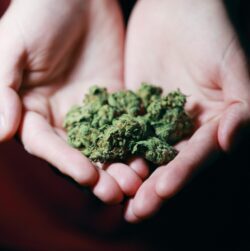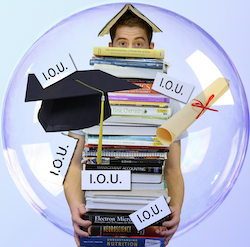Legal cannabis and new psychedelic research have scrambled old paradigms. It’s critical to rethink how we talk to kids about drugs. Here are three essential tips for parents.
A frying pan over a hot flame appears on the screen, butter bubbling. “This is drugs,” says a voice. A hand appears and cracks an egg into the pan. “This is your brain on drugs,” says the voice as the egg sizzles.
As a child of the 80s, this 1987 PSA stuck with me. As did the mangled car on the lawn of my high school, placed there by MADD (Mothers Against Drunk Driving). Add Nancy Reagan’s omnipresent “Just Say No” campaign, and I became a teenager who was pretty scared that trying any drug would lead to shame, a scrambled brain, and sooner or later, a painful death.
I imagine it must have been easier to talk to kids about drugs when the message was wrapped up in fear and abstinence (though not necessarily effective). But things have changed. Attitudes about marijuana have evolved at light speed and the law has followed. Today, there are just seven states in the union that outlaw marijuana entirely. It’s fully legal in 17 states, and in 26 states, marijuana is either legal for medicinal purposes, decriminalized, or both.
Similarly, there has been (another) culture shift in attitudes towards psychedelics. Once the province of the counterculture, the narrative consisted of terrifying stories of psychosis, bad trips, and fatal outcomes (not to mention the horror of possibly becoming a hippie!). But there’s been a scientific sea change that is soon to be thrust into the medical mainstream.
These cultural shifts have certainly complicated the job of parents when it comes to how we talk about drugs. It’s no longer responsible to frame the issue in simple moral platitudes (was it ever?). Kids are masterful at sniffing out inconsistencies, and without careful and honest dialogue, we risk leaving a critical part of our responsibility as parents to potentially unreliable and dangerous sources.
Only a proactive and candid approach will be sufficient to help fortify kids against misinformation and unneeded risk-taking. There are three conversations every parent should have with their children.
- Dad, have you tried drugs?
Anecdotally, the number of parents who use marijuana recreationally has skyrocketed since the laws have changed. If you walk into a dispensary, you are likely to see middle-aged folks browsing and shopping like it’s the Apple store (so I’ve heard). But if you stop and think, how is it any different from parents who pick up a bottle of wine at the supermarket? It’s commonplace for parents to have a drink in front of their kids, but I doubt many parents are lighting up a joint after dinner. The difference is the historical taboo that many of us grew up with.
It seems impossible to drive anywhere without passing a marijuana dispensary or billboard, which recently led to an unexpected question from my 13-year-old: “Dad, have you tried weed?”
Kids, especially younger adolescents, often ask about a parent’s experiences as a way of expressing their own curiosity about more adult behaviors. Beware, this is a trap! A parent’s own choices are personal and many parents believe that if they aren’t 100% honest about what they have or haven’t tried, their children won’t ever trust them again. But a straightforward answer is a setup and won’t truly help a child process their own questions and decisions.
A more effective response is to ask the child what they are wondering about. Are they thinking about trying it? Have they heard friends discussing it? Did they see something on TikTok? Likely, the child will respond that they just want to know, as if they have a right to know. Parents need to honor their child’s curiosity, but a yes/no answer does exactly the opposite.
It is far more honest and respectful to explain why the parent’s history isn’t actually relevant. If I tell my daughter that I have or do use marijuana, it could be heard as permission. If I tell her that I have not or do not use marijuana, it could cause shame and result in her viewing me as someone who wouldn’t understand. Either way, the conversation is shut down. Instead, I recommend that parents turn it into an opportunity for kids to ask questions and talk about what’s on their mind without feeling judged. This also prevents parents from removing themselves as an important resource.
Thus, we treat our children as people who are capable of understanding nuance and who don’t default to black and white interpretations of more complex issues. We serve as a grounding presence who can be a trusted source of information and support in times of need.
- Let facts and science be your guide
Every morning, I pour my 11-year-old a large cup of steaming hot coffee. “Drink it all,” I tell him. Actually, that’s not true. I do not give my kids coffee. Is coffee evil? Obviously not. I choose not to give my kids coffee because it can have harmful effects on children, such as increased anxiety, increased heart rate and blood pressure, and sleep disturbance. Period.
The discussion about drugs should be couched in the same fact-based scientific considerations. Alcohol, for example, can be harmful to anyone drinking it. Even so, it’s legal for adults to consume and I sometimes have a beer with dinner or an occasional cocktail in the evening. In front of my kids. But I do not make it available to my children. I’d bet the same is true of most homes.
Kids need help understanding how to square this apparent contradiction. As with caffeine, it’s a simple but important conversation. Alcohol, like many things, can be enjoyable for adults in moderation. But there is clear data indicating the negative effects of alcohol on adolescent brain development. Kids can handle these types of facts. It empowers them.
More interesting, perhaps, is the case of marijuana. It used to be easy for parents to default to the legal prohibition – it’s not legal so it’s not ok. But it’s (mostly) legal now for adults, just like alcohol. If you’re like me, however, there remains a cognitive incongruence. Despite evidence that in many ways, weed is safer than alcohol, I still can’t imagine a day when it is the norm for parents to consume edibles or take out a vape pen in front of their kids.
Thus, the answer is to demystify marijuana by using facts, science, and evidence. And we start this process by removing moral judgment.
Marijuana, like alcohol, can harm children. The consequences can include impaired short-term memory, decreased concentration, and depleted problem-solving skills, all of which interfere with learning. The adolescent brain, particularly the prefrontal cortex areas that control judgment and decision-making, is not fully developed until the early 20s, raising questions about how any substance use may affect the developing brain. Kids need to know this.
The goal here isn’t to scare kids or manipulate them into steering clear. Rather, it’s to respect them enough to share facts that they can integrate into their decision-making. Our kids will (or already have) come into contact with weed. That’s pretty much guaranteed. We want them to be armed with the information that reduces the titillation that accompanies the forbidden for kids.
- Tell the story
Like millions of other people, I recently read Michael Pollan’s book, “How to Change Your Mind: What the New Science of Psychedelics Teaches Us About Consciousness, Dying, Addiction, Depression, and Transcendence.” What struck me most was how the history of psychedelics was so disconnected from the scary cultural narrative that I was raised with. It’s almost as if a story about psychedelics was fabricated to further a particular point of view (it was).
It’s true that the past decade has seen an explosion of rigorous scientific research into the effects of psychedelics, which has pushed them closer to mainstream science than ever before. And that’s a story that is worth telling our kids. It won’t be long until medicines like psilocybin will have to be discussed in the same sentences as Prozac or other antidepressants, just like cannabis is used to treat glaucoma.
There is great value for kids in being able to hold two separate truths at the same time. Psychedelics, just like weed and other drugs, can be very dangerous. They can also be medically helpful when used appropriately.
The stories of what these drugs are, how they have been used in the past, and what modern science is telling us today can inform kids in an objective way. That’s how we should look at medicine, for all of its positives and negatives. As an educator, I believe that knowledge should never be feared or withheld, nor should it be used to scare or manipulate. As parents, we need to trust our kids enough to have these kinds of conversations, even if our own experiences and culture have imprinted certain meanings on our awareness and opinions.
As parents we need to evolve past the messages we received growing up and address these issues from a perspective of truth, science, and fact. That’s the best way our kids will hear that we truly care for them, trust them, and respect them as human beings.
________________
McVay, E. (2021, February 20). Is coffee bad for kids? Is Coffee Bad for Kids? – Johns Hopkins All Children’s Hospital. Retrieved from https://www.hopkinsallchildrens.org/ACH-News/General-News/Is-Coffee-Bad-for-Kids.
Ryan, S. A., Ammerman, S. D., & Committee On Substance Use And Prevention. (2017, March 1). Counseling parents and teens about marijuana use in the era of legalization of marijuana. American Academy of Pediatrics. Retrieved from https://pediatrics.aappublications.org/content/139/3/e20164069.
Pollan, M. (2019). How to change your mind: What the new science of psychedelics teaches us about consciousness, dying, addiction, depression, and transcendence. Penguin Books.


